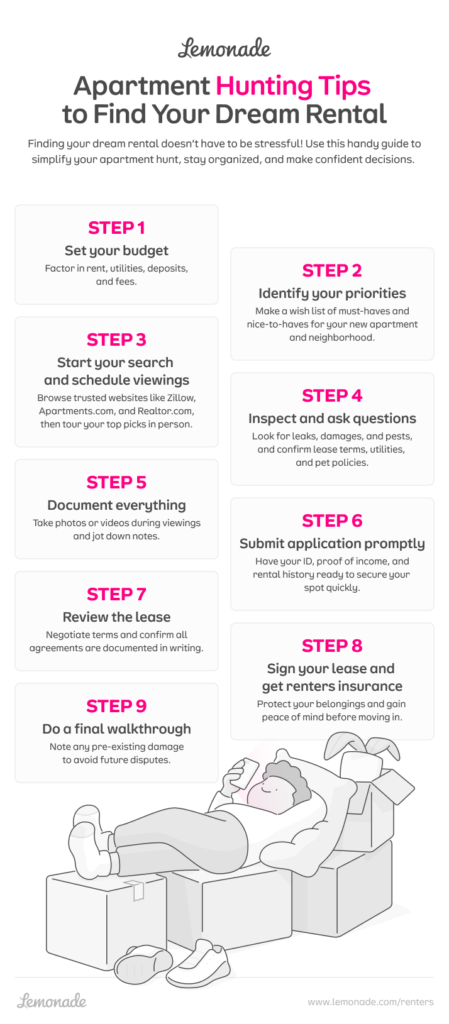16 Apartment Hunting Tips to Find Your Dream Rental
Moving is a drag. Let's make it a little easier.

Moving is a drag. Let's make it a little easier.

As if moving weren’t tough enough already, you also have to find a place to move to. But with a little bit of planning, your search need not be so daunting.
Follow these 16 easy steps, and you’ll land a sweet new crib in no time.

Want to keep these tips handy? Download our apartment hunting tips for an in-depth guide to finding your perfect place!
Your head might be filled with visions of exposed brick walls and stunning rooftop vistas, but make sure to have realistic goals.
In setting your budget, factor in the costs of rent, utilities, broker fees (which can often be as high as a full month’s rent), the security deposit, and any possible extra fees. Determining how much rent you can afford will make your hunt more efficient.
Target neighborhoods that suit your current lifestyle. When researching an area, you should consider its proximity to work, its public transit options, and, of course, its overall vibe: quiet and family-centric, or boozy and bohemian?
Whatever your idea of the “perfect” neighborhood may be, try to keep your options open by checking out at least a couple of different areas. And we’ve got some advice if you still haven’t even figured out what city you want to move to.
Whether you want a central location, in-unit laundry, or a gym, deciding what’s essential to you will help determine what to look for in an apartment.
Order by priorities and what things are “must-haves” VS “nice-to-haves.” And be practical: Sure, it’d be nice to have a stainless steel Sub-Zero fridge or a fancy Japanese toilet, but is it worth sacrificing the closet space?
Use reliable websites—Zillow, Realtor.com, Apartments.com—to browse listings, compare prices, and gather information on different neighborhoods and buildings.

Block out at least a weekend to look at places. Online photos and Google Street View never tell the full story; you’ll definitely want to see your future apartment and neighborhood IRL. Plan to start early in the morning to give yourself ample time to hit up multiple properties and avoid rushed decisions.
Inquire about the lease terms, utilities, building maintenance, and whatever else comes to mind. Unsure what to ask? Here’s every question you might want to bring up before committing.
Check for signs of pests, mold, leaks, broken fixtures, and overall cleanliness during your walk-through. Follow our handy apartment walkthrough checklist to make sure you don’t miss anything.
Snap photos or videos during your visits for reference later. You might want to start each set of pictures off by photographing the exterior of the building, with its address number visible, so you can keep the properties you visited straight in your mind.
The market moves fast, so make sure to have all the necessary documents in line once you’re ready to pounce on a place. This typically includes your ID, proof of income, and rental history. Your prospective landlord will likely require a credit check. Being prepared can expedite the process.
Make sure that you’re able to meet your landlord’s income requirements. In some cities like New York, you’ll need to furnish proof that your annual salary (or you and your roommates’/partner’s combined salary) is 40x one month’s rent.
If you don’t reach that bar, you may need to secure a guarantor whose annual income is 80x monthly rent. But if you aren’t able to meet these steep and often prohibitive requirements, there are still ways to get around them.
Once you find a place you like, submit your application ASAP. If you’d like to boost your chances of acceptance in a competitive rental market, check out our advice on ingratiating yourself with the landlord.
Yes, we know it’s boring—but thoroughly read through the lease agreement. Ensure that you understand the terms, restrictions, and what is expected from you as a tenant.
It might feel like a waste of precious time to read every word, but don’t skip the fine print. You’ll need to know all of your rights as a tenant should any problems arise later.
Also, double-check the lease agreement and ask the landlord about the process of how to set up utilities—including things like what utilities are included, and if there are preferred service providers.
Before signing, you should also look for reviews of the landlord or apartment complex for any signs of malpractice or general shadiness. Popular review sites include Open Igloo, Rate The Landlord, Rate My Landlord, WYL, and ApartmentRatings.
If possible, negotiate the terms of your rent. Whether it’s the rent amount or lease duration, a little negotiation could save you a lot of money.
And don’t rely on verbal agreements—get everything in writing. If, for example, your landlord tells you that a cat is OK, but the lease specifies “no pets,” make sure that the lease itself is amended to allow cats.
Before moving in, do a final walkthrough. Document any existing damage—scuffs on the wall, cabinets missing handles, a wonky oven—to ensure that you’re not held responsible down the line.
This will come in handy when you need the landlord to do some repairs, or when you’ve moved out and are waiting to get your security deposit back.
Haven’t you heard? The right renters insurance can help protect your valuables against damage from fire, burst pipes, theft, and so much more. It will also give you personal liability coverage that will protect you should a friend injure themselves at your banger of a housewarming party.
A few quick words, because we <3 our lawyers: This post is general in nature, and any statement in it doesn’t alter the terms, conditions, exclusions, or limitations of policies issued by Lemonade, which differ according to your state of residence. You’re encouraged to discuss your specific circumstances with your own professional advisors. The purpose of this post is merely to provide you with info and insights you can use to make such discussions more productive! Naturally, all comments by, or references to, third parties represent their own views, and Lemonade assumes no responsibility for them. Coverage and discounts may not be available in all states.
Please note: Lemonade articles and other editorial content are meant for educational purposes only, and should not be relied upon instead of professional legal, insurance or financial advice. The content of these educational articles does not alter the terms, conditions, exclusions, or limitations of policies issued by Lemonade, which differ according to your state of residence. While we regularly review previously published content to ensure it is accurate and up-to-date, there may be instances in which legal conditions or policy details have changed since publication. Any hypothetical examples used in Lemonade editorial content are purely expositional. Hypothetical examples do not alter or bind Lemonade to any application of your insurance policy to the particular facts and circumstances of any actual claim.